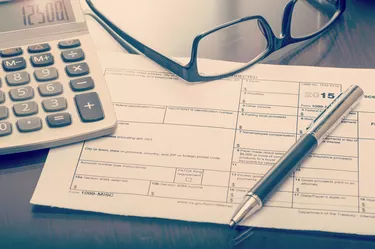
IRS Forms 1098 and 1099 are used when filling out your tax return. Form 1098 reports money you paid to someone else while Form 1099 accounts for non-wage payments you received. These forms help you keep track of taxable income and possible deductions.
Form 1098
Video of the Day
The primary Form 1098 reports the amount of mortgage interest you paid your mortgage lender during the tax year. Your mortgage lender is required to send out the form at year end if you paid more than $600 in interest and points on the loan during the year.
Video of the Day
You enter the mortgage interest information on Form 1098 as an itemized deduction on Schedule A, line 10. If you paid any other interest that wasn't reported on a 1098, you enter it on the next line. If you claim the standard deduction, you can't write off any itemized deductions.
If you paid less than $600 in interest, you may not receive a Form 1098 from your lender, but you can still enter the amount on your tax return if you itemize deductions..
Form 1098-T and Form E
The 1098-T and 1098-E forms deal with educational expenses. If you pay a lender more than $600 in interest on a student loan during the year, you receive a 1098-E. If you qualify to deduct the interest, you report it on your 1040, line 33. You can take the deduction even if you paid less than $600 in interest and didn't receive a 1098-E.
Colleges use the 1098-T to report the amount of tuition and related expenses you paid during the year. The tax code offers several different credits and deductions for tuition, described in IRS Publication 970. If you qualify for more than one deduction, you can choose whichever offers you the biggest tax break.
Form 1098-C
If you donate a vehicle worth more than $500 to a charity that qualifies for tax-deductible donations, the charity sends you a 1098-C reporting the contribution. You report the deduction on Line 17 of Schedule A.
Form 1099
The forms in the 1099 family each report a different type of non-wage income.
1099-MISC
If a business sends you a 1099-MISC, it's usually because the company paid you $600 or more in freelance income. You usually report this on the same form you use for your other business income — Schedule C if you're a sole proprietor, for example.
Any money a company pays you for your work must be reported on your tax return, even if it is less than $600 and you don't receive a 1099-MISC. Only businesses send out a 1099-MISC. If you make $1,000 worth of repairs at a private home, rather than a business, the owner doesn't have to send you a Form 1099-MISC. Your pay is still taxable though and should be reported on your tax return.
1099-R
Many Americans receive Form 1099-R, because it reports various types of withdrawals from retirement plans including:
- IRA distributions
- IRA rollovers
- Pensions and annuities
- Loans from a 401(k) account
- IRA distributions under a divorce decree that says you have to give your spouse some of the money.
Where you report the money depends on what kind of withdrawal is involved. Some withdrawals, such as a loan from a 401(k) aren't subject to tax as long as you repay the money.
Other 1099s
Among the other varieties of 1099 forms are:
- 1099-DIV, for dividends.
- 1099-C for cancellation of debt. If someone forgives a debt you owe, the amount can count as taxable income.
- 1099-INT for earned interest.
- 1099-SA for distributions from various types of health savings account.
Keeping the Forms
The IRS says to keep tax paperwork three years after you file a return, or six years if you've under reported income by 25 percent or more. This rule applies to Forms 1098 and 1099 as well as Form 1040. If a business or organization sends you a Form 1099 or 1098, it also sends one to the IRS, so the agency can confirm the accuracy of your tax paperwork.